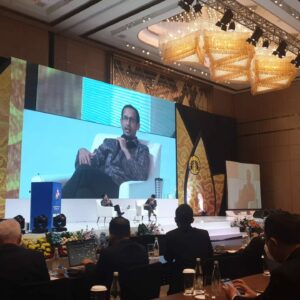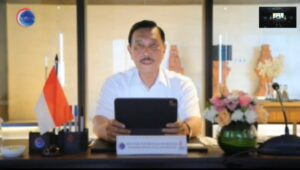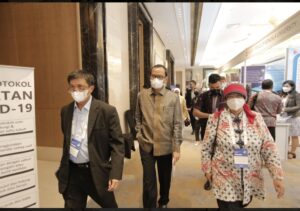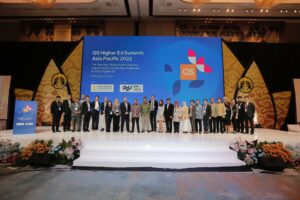
Depok, November 10th 2022. One of the result of the Covid-19 pandemic is the transformation in education that brings about many big changes and creates opportunities to do things that have not been done before. “This huge change we have made may not be possible for me to make even in ten years’ time. With the presence of Covid-19, within one year, almost three million teachers across Indonesia were forced to use technology. Even if I try with a big budget, can’t reach this impact in ten years time. This can happen because schools and teachers are forced to use technology to teach. They themselves have opened the doors of opportunities to adopt digital from various educational technologies that we can provide free of charge to teachers, so the ministry takes that opportunity and builds various educational platforms,” said Minister of Education, Culture, Research and Technology Nadiem Anwar Makarim, B.A., M.B.A., on the second day of the QS Higher Ed Summit: Asia Pacific 2022 activity at the Intercontinental Hotel Jakarta, Wednesday (09/11).
In every policy issued by the Ministry of Education, Culture, Research, and Technology (Kemendikbudristek), Nadiem said this was done to carry out transformation so that they could move as quickly as possible and one example of the breakthrough that was issued was Merdeka Learning. This program is a combination of academic theory with real-world applications.

On the same occasion, General TNI (Ret.) Luhut Binsar Pandjaitan, M.P.A. Coordinating Minister for Maritime Affairs and Investment of the Republic of Indonesia (Coordinating Minister for Maritime and Investment Affairs) who was present virtually stated that in the Merdeka Learning program there was a Guerrilla Program. This program provides opportunities for university students from both vocational and technology programs to develop renewable energy competencies.
“As part of the government’s efforts to expand academic and research activities related to renewable energy, the Education Fund Management Institute (LPDP) provides scholarship schemes for master’s and PhD programs to study renewable energy at the best universities around the world. LPDP also provides a research funding scheme known as RISPRO of up to approximately US$150,000 per research scheme focused on renewable energy. The result of the efforts of the government and many important higher education stakeholders, several international leading university rankings recognize the performance of the leading Universitas Indonesia at the global level in achieving the Sustainable Development Goals (SDGs) including the issue of renewable energy,” said Luhut.

In line with what the two ministers said, in the discussion panel with the theme “Intraregional Collaboration and Influence” the Vice Chancellor for Academic and Student Affairs, Universitas Indonesia (UI), Prof. Dr. rer. grout. Abdul Haris, said that one of the keys for Universitas Indonesia to reach its current position is to intensify the global engagement.
UI has worked with partners in 47 countries and is a member of 14 regional consortiums. In addition, the synergy between UI and the Kemendikbudristek Independent Learning program encourages students to provide opportunities for students to develop skills according to their needs, interests, and talents. More Prof. Abdul Haris explained that the collaboration must also focus on actual results and real impacts, which connect universities with the real world.
At the same discussion panel, three other speakers were present, namely the General Director of Higher Education, Research, and Technology (Dirjen Diktiristek) Prof. Ir. Nizam, M.Sc., DIC., Ph.D.; Assistant President for ASEAN Affairs and the Creative Economy Prince of Songkla University, Asst. Prof. Dr. Supatra Davison; and Assistant Director/Head-Education, Youth, and Sports Division The ASEAN Secretariat, Dr. Roger Y Chao. Jr.
Prof. Nizam said that currently the government is transforming the education system on many aspects. “Because we believe that the most important role of higher education is for preparing human resources,” he said.

On the second day of the QS Summit conference, the event began with the announcement of the QS Asia University Rankings 2023 and UI was ranked 49th in Asia. This position is the highest position among other universities in Indonesia. Then, the activity continued with a panel discussion with various themes, including Equal Opportunities for All, Equatable Partnerships, and Intraregional Collaboration and Influence. At the end of the event, it is closed with QS Stars and QS Certificate of Recognition awards presentation which divided into the most sustainable institutions by region in various fields, including Recognition of Improvement, Research Excellence, Reputation Impact, and New Entrants Award Categories.



